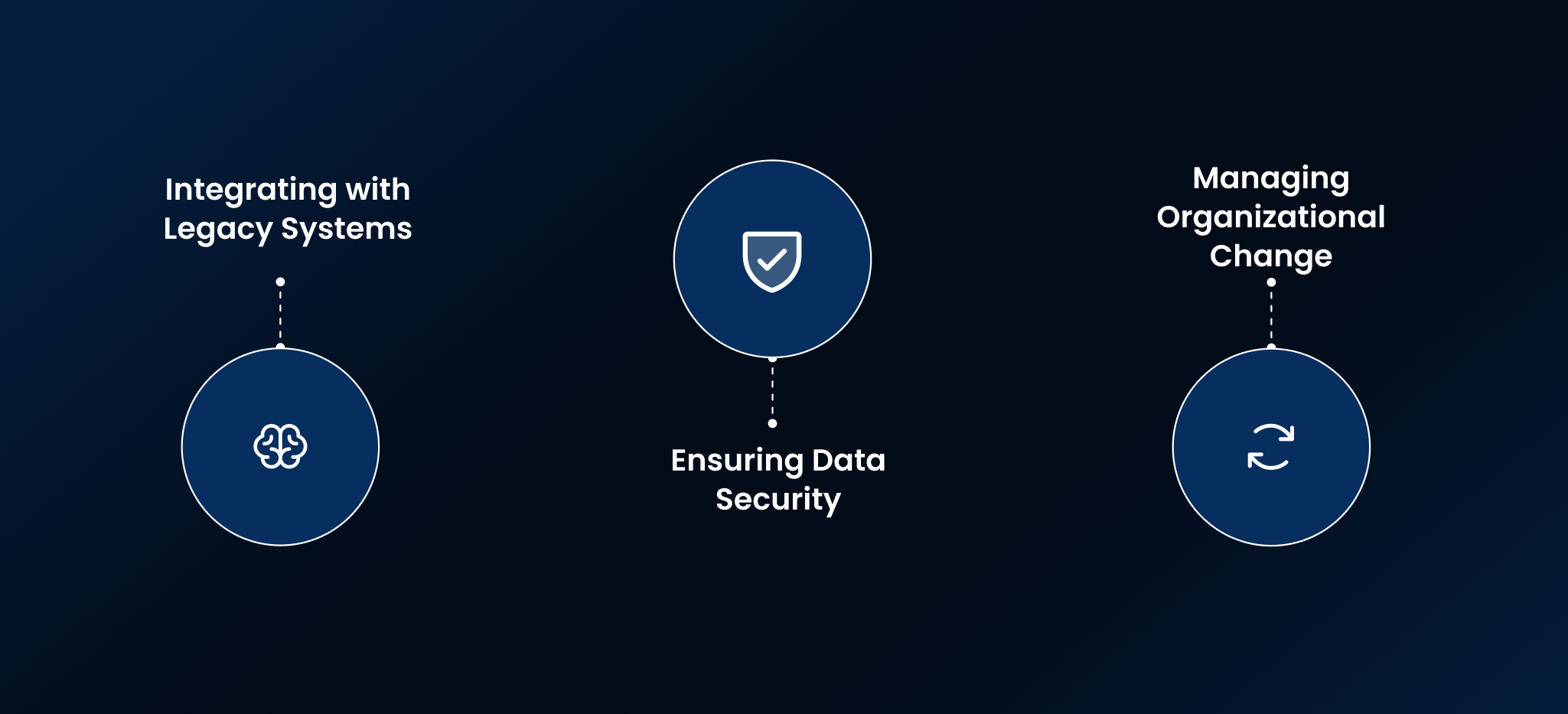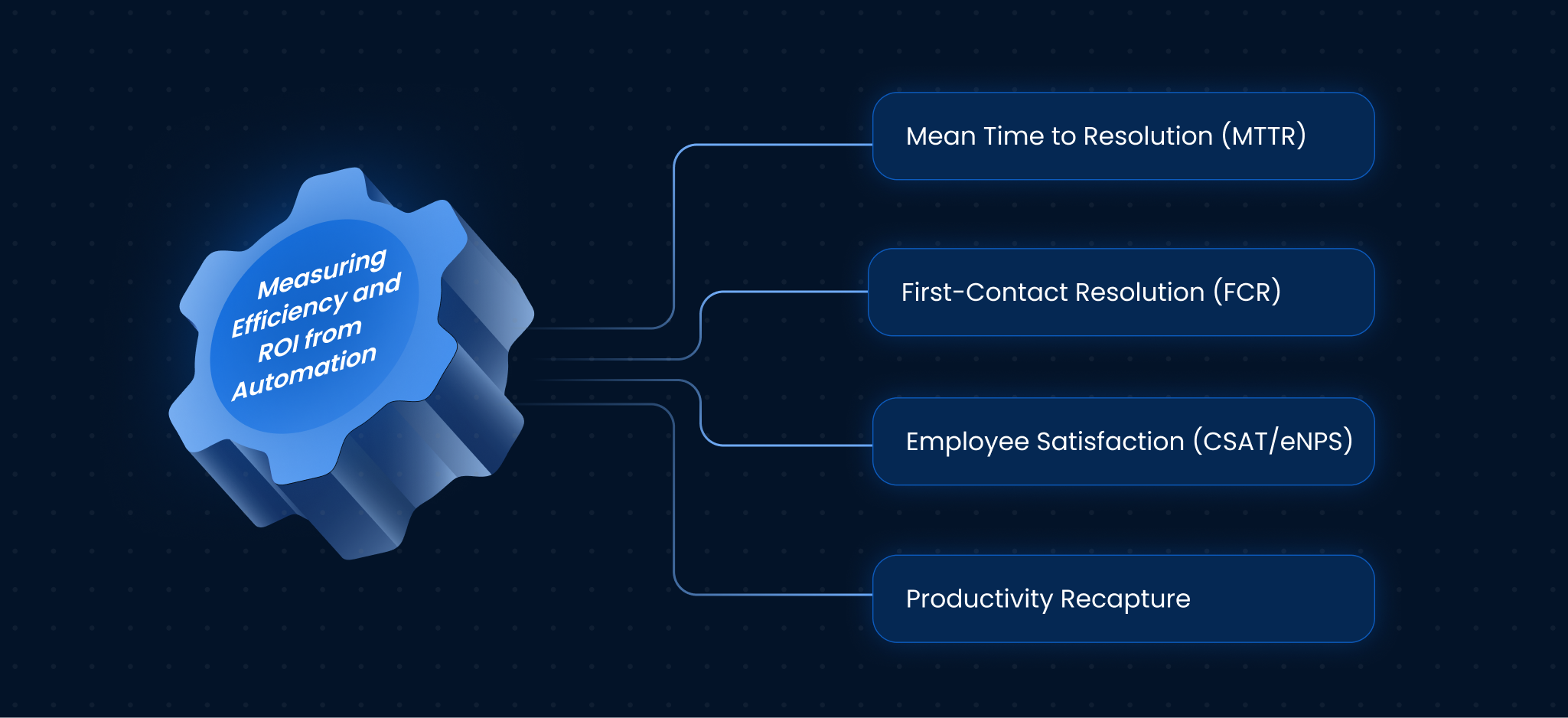Introduction
As a technology leader, you’re constantly balancing two competing realities: the demand for instant, seamless employee support and the operational strain it puts on your teams. Every minute an employee spends wrestling with a password reset or tracking down a policy document is a minute they’re not driving the business forward. This friction is where ai automation services are stepping in, not just as a temporary fix, but as a fundamental shift in how work gets done. These services are moving beyond simple chatbots to become a true digital workforce, capable of understanding, acting, and resolving complex employee requests autonomously.
This guide will walk you through exactly what modern ai automation services can do for your organization. We’ll explore how they’re transforming core business functions, what to look for in a solution, and how to measure their true impact on your bottom line.
Transforming Business Operations with AI Automation Services
So, what are ai automation services? At their core, they are advanced software solutions that use artificial intelligence to manage and execute complex business processes without human intervention. Think of it less like a simple script that follows rigid rules and more like a smart assistant who can understand context, make decisions, and learn from interactions.
For years, automation meant Robotic Process Automation (RPA), which is great at mimicking repetitive, rules-based human actions like data entry. However, AI automation takes it a giant leap forward. Instead of just doing, it understands.
For instance, when an employee types, “My laptop is running super slow and I can’t open the new sales deck,” an older system might get stuck. But an intelligent system understands the sentiment (frustration), identifies the entities (laptop, sales deck), and initiates a multi-step resolution workflow. This is the new benchmark for enterprise support.
Automating IT, HR, and Finance Workflows at Scale
The impact of these services is most profound in the high-volume, high-friction departments that serve your entire workforce. Consequently, automating these workflows at scale is a top priority for forward-thinking leaders.
- For IT Departments: Your IT help desk is likely overwhelmed. Common issues like password resets, software access requests, and VPN troubleshooting can consume hundreds of hours. An ai automation service acts as a tireless front line, capable of autonomously resolving a huge portion of these tickets. It can provision software, reset credentials across multiple systems, and run diagnostics, freeing up your skilled technicians to focus on strategic projects.
- For HR Teams: Imagine every employee getting instant, personalized answers to questions about their benefits, pay stubs, or time-off policies. AI can handle these queries 24/7. Furthermore, it can automate entire processes like employee onboarding, from creating accounts to scheduling orientation, ensuring a smooth, welcoming experience for new hires from day one.
- For Finance Departments: Manual tasks like processing invoices and approving expense reports are notoriously slow and prone to error. AI automation can intelligently scan invoices, match them to purchase orders, check for policy compliance on expense reports, and route them for approval, drastically cutting down processing time and improving accuracy.
Real-World Enterprise Applications of AI Automation
Let’s move from theory to practice. How do ai automation services look in a typical American workplace?
Scenario 1: The Urgent Software Request
- Before: An employee on your sales team needs access to a specific analytics tool for a critical client demo in two hours. They file a ticket. It sits in a queue, gets assigned, requires manager approval via email, and then an IT admin has to manually grant the license. The two hours are up, and the opportunity is at risk.
- With AI Automation: The employee messages the AI agent: “I need access to DataDrill Pro ASAP for my Acme Corp demo.” The agent instantly verifies their role and department, checks the license-approval policy, sends an instant approval request to their manager’s phone, and upon approval, automatically provisions the software. The entire process takes less than five minutes.
Scenario 2: Navigating Parental Leave
- Before: An expecting parent has to navigate a confusing internal portal, download multiple PDFs, and email HR with specific questions about their eligibility and pay. The back-and-forth takes days.
- With AI Automation: They ask the AI agent, “What’s our parental leave policy?” The agent doesn’t just send a link. It asks a clarifying question, “Are you the birthing or non-birthing parent?”, and then provides a personalized summary of their specific leave duration, pay details, and required forms based on their tenure and location. It can even help them initiate the leave request right from the conversation.
These examples show how ai automation services aren’t just about efficiency; they’re about creating a better, more responsive employee experience.
How Leena AI Powers Smarter, Autonomous Enterprise Workflows
At Leena AI, we’re focused on the next evolution of this technology: Agentic AI. Think of it as the difference between a virtual assistant that can look up information and one that can book your entire trip, flights, hotel, and rental car, all on its own. Our AI agents are designed to be autonomous workers for your enterprise.
We’ve pioneered the use of Agentic AI in IT, creating a system that doesn’t just deflect tickets but resolves them from start to finish. Here’s how we create value:
- Autonomous Resolution: Leena AI’s agent doesn’t just pass tickets to humans. For a huge range of issues, from managing user groups in Active Directory to troubleshooting application errors, our AI agent performs the necessary actions across your systems to fix the problem. This allows us to autonomously resolve up to 70% of all incoming IT support tickets.
- Proactive Problem-Solving: Our platform analyzes ticket patterns to spot recurring issues. If dozens of people in the Chicago office are reporting slow Wi-Fi, the agent won’t just solve their individual tickets. It will identify the trend, create a master “problem” ticket, and notify the network engineering team, preventing hundreds of future complaints.
- Seamless Integration: Leena AI is built to work with the tools you already use. It integrates deeply with ITSM platforms like ServiceNow, HR systems like Workday, and communication channels like Slack and Microsoft Teams to create a unified, conversational experience for employees.
The goal is to deliver a “self-driving” enterprise where employees get what they need instantly, allowing them to focus on what they were hired to do.
Overcoming Challenges in AI-Driven Automation
Adopting any new technology, especially one as powerful as AI, comes with valid questions. Technology leaders are rightfully concerned about a few key areas.
- Integrating with Legacy Systems: You can’t just rip and replace the systems you’ve built over decades. The right ai automation service is designed to be an intelligent layer that sits on top of your existing infrastructure. Through robust APIs and pre-built connectors, it integrates with your current systems of record, enhancing their capabilities without requiring a massive overhaul.
- Ensuring Data Security: Handing processes over to an AI requires trust. Enterprise-grade AI platforms are built on a foundation of security. They adhere to strict compliance standards like SOC 2 and GDPR, ensuring your company and employee data is always protected through encryption, access controls, and regular audits.
- Managing Organizational Change: Your employees and support teams might worry that AI is here to replace them. The key is to frame it as augmentation, not replacement. The AI handles the repetitive, high-volume tasks, freeing your talented IT and HR professionals to become strategic advisors who tackle the most complex and high-value challenges.

Measuring Efficiency and ROI from Automation
The business case for ai automation services must be built on a foundation of clear, measurable results. While cost savings from reduced support headcount is an obvious benefit, the true return on investment (ROI) is much broader.
Here are the key metrics to track:
-
Mean Time to Resolution (MTTR): Measure the dramatic reduction in the time it takes from when an employee raises an issue to when it’s fully resolved.
-
First-Contact Resolution (FCR): Track the percentage of issues resolved in the very first interaction, without needing to be escalated to a human agent.
-
Employee Satisfaction (CSAT/eNPS): Survey your employees. Are they happier with the support they’re receiving? A frictionless internal experience is directly linked to higher employee retention.
-
Productivity Recapture: Calculate the hours saved across the entire organization. If you save 10,000 employees just 15 minutes each month, that’s 2,500 hours of productive time reclaimed, every single month.
A successful implementation doesn’t just cut costs; it creates a more efficient, productive, and satisfied workforce.
Choosing the Right AI Automation Service for Your Organization
With a growing market, selecting the right partner is critical. Look beyond the flashy demos and evaluate platforms based on these core criteria:
- True Autonomy: Does the service offer genuine, end-to-end resolution, or is it just a sophisticated routing tool? Ask for proof of its ability to act on its own.
- Enterprise-Grade Integration: Can it seamlessly connect with your complex ecosystem of applications, including ServiceNow, Workday, Salesforce, and even custom-built internal tools?
- Scalability and Reliability: Is the platform built to handle the ticket volume of a company with tens of thousands of employees without performance issues?
- No-Code Simplicity: Can your own process owners in IT, HR, and Finance easily build and modify automation workflows without needing a team of developers?
- Deep Domain Knowledge: Does the provider understand the specific challenges and nuances of enterprise workflows, or are they offering a generic, one-size-fits-all solution?
Trends Shaping the Future of AI Automation Services
The field of ai automation services is evolving rapidly. Looking ahead, we can expect even more sophisticated capabilities to become standard.
- Hyper-Personalization: The AI will know an employee’s role, location, and even their current projects to provide incredibly context-aware support. It will anticipate their needs before they even ask.
- Proactive and Predictive Support: Instead of waiting for something to break, the system will identify potential issues, like an expiring software license or a server reaching capacity, and resolve them preemptively.
- Generative AI for Problem Solving: AI will not only follow workflows but will use generative models to create novel solutions to unique problems, drafting custom scripts or suggesting new process improvements for your teams to review.
The future is less about asking for help and more about having an intelligent system that ensures you never need it in the first place.
Ready to see how an AI agent can transform your enterprise? Explore Leena AI’s solutions today.
Frequently Asked Questions about AI Automation Services
What are ai automation services?
They are advanced platforms that use artificial intelligence to autonomously manage and execute business workflows, particularly in areas like IT, HR, and Finance, to resolve employee requests without human intervention.
How do ai automation services differ from traditional RPA?
While RPA is designed to mimic repetitive human clicks and keystrokes based on strict rules, ai automation services can understand unstructured data (like natural language), make decisions, and handle complex, multi-step processes with greater flexibility and intelligence.
What is the typical implementation timeline for these services in a large company?
With modern, cloud-native platforms, a first phase can often be rolled out in just 6-8 weeks, typically starting with the highest-volume use cases to deliver a rapid return on investment.
How do you ensure the security of data used by ai automation services?
Leading providers adhere to enterprise-grade security protocols, including SOC 2 and ISO 27001 compliance, end-to-end data encryption, and robust access controls to ensure your data is always secure.
Can these services integrate with our company's custom-built applications?
Yes, top-tier ai automation services are designed with integration in mind and offer flexible APIs and development kits to connect securely with proprietary, in-house systems.
What level of autonomy can we expect from modern ai automation solutions?
Leading solutions, particularly those using Agentic AI, can achieve over 70% autonomous resolution rates for common IT and HR support tickets, handling the entire process from request to resolution.
How will introducing ai automation services impact our existing support teams?
It empowers them. By automating the high-volume, repetitive tasks, it frees your skilled support professionals to focus on more complex, strategic initiatives that require a human touch, elevating their role within the organization.














